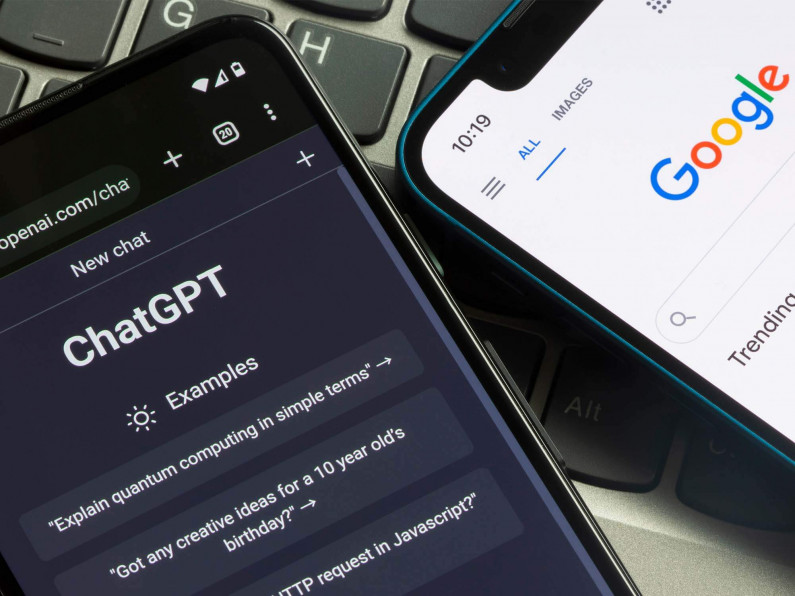ChatGPT impresses with its high quality texting abilities. Thanks to the fast innovation in AI technologies, many softwares are already being used for marketing and business purposes – first and foremost for search engine optimisation (SEO). But how suitable is ChatGPT for this? What can the AI do and what should be considered when using it? An overview.
The US financial site BankrateCom uses machine-generated content – with success. Several pages land among the first organic hits on Google. According to Johannes Beus, CEO of the SEO tool Sistrix, around 162 automatically generated articles have been published on BankrateCom in the past six months or so and are recording good Google rankings.
Is this proof that the use of AI texts for search engine optimisation is a perfect solution? Does this mean that texts created by ChatGPT are not penalised by Google? Sadly, it’s not quite that easy.
On the one hand, Beus reports that the automatically generated texts were proofread and checked by editors. Accordingly, the success cannot be attributed solely to the AI. On the other hand, the SEO expert emphasises that this is a “very specific use case” at a “very specific point in time”. ChatGPT came onto the market faster than Google could optimize their ranking algorithms to account for this new form of content – and BankrateCom benefits from this circumstance. At least for the time being.
Let’s clarify: anyone who is thinking of using ChatGPT for SEO should definitely keep an eye on whether there are any algorithm adjustments from Google. Therefore, you should definitely keep this Google Guide, which contains an overview of the ranking systems, bookmarked!.
Google’s perspective on AI texts as from ChatGPT
Back in November 2022, Duy Nguyen from Google’s search quality team said in this video: “Taking over content, even with some modifications, violates our spam policy.” Duy added that Google “has many algorithms to track such behaviours and downgrade sites that take content from other sites.” The preceding question was how authors of texts should react to websites that use AI to plagiarise or alter content in order to end up performing better in search results. In this context, it will also be exciting to observe how the qualities of Google’s in-house chatbot “Bard” will look in practice.
Google also rolled out its “Helpful Content System” update for English-language websites as recently as August 2022. The update aims to push value-added content written by people for people. In December, the “Helpful Content System” was extended to all languages. According to various SEO experts, the update has not had a major impact so far – yet Google seems to be pursuing a clear goal. The measures were rounded off at the beginning of February when Google published a clear statement on how the search engine stands on the use of automatically generated content.
Incidentally, immediately after the publication of ChatGPT at the end of November, 22-year-old student Edward Tian from Princeton University started developing the app “GPTZero”. This is intended to be able to debunk AI texts – and thus serve as a tool to combat the increasing plagiarism by AI. Only recently, OpenAI released a similar tool, the “AI classifier”.
Pitfalls of ChatGPT for SEO
It is also clear that ChatGPT is not yet fully developed. The social networks are full of posts showing that ChatGPT can also spout real nonsense. For example, that elephants lay the biggest eggs or that good scientists must have the characteristics “white” and “male”. If you explicitly ask for the source of an article, you will get answers – but some of them are made up. In the meantime, OpenAI has already made the first adjustments and updates, but healthy scepticism is still recommended here.
Moreover, you should keep in mind that the data on which ChatGPT was trained currently only extends to the year 2021. This can be problematic for search engine optimisation, as Google prefers content that is up-to-date for many topics.
In this sense, there is already something to be said against blindly adopting automatically generated content. In any case, quality assurance and a fact check are needed. In addition, editors should revise the texts again – if only to adapt them in terms of target group tonality. And to make sure that the SEO texts are really in line with the SEO strategy.
Speaking of SEO strategy: The crux of the matter is also that SEO texts are not only based on writing.
What does SEO all involve with regard to content?
The following aspects are considered in every SEO text:
- Keyword research
- Competition analysis
- Topic research
- Integration of current and unique content
- Topic cluster
- Editorial plan
- Onpage optimisation
- External & internal linking of new/old content
- Publishing of content
- Updating old or non-performing content
SEO experts, like Aleyda Solis, therefore highlight that it is much more effective, both in the short and long term, to consider AIs as tools for search engine optimisation.
How ChatGPT can help with SEO: Five examples
1) Finding topics for blog posts
Where to start. ChatGPT offers an efficient way to find inspiration for topics. An easy way is to directly ask for headlines for articles that are in the semantic field of your own business.
But beware: ChatGPT tends to be redundant. It should be ensured that the topics are really different – and not simply synonyms (see for example Headline 1 and 2).
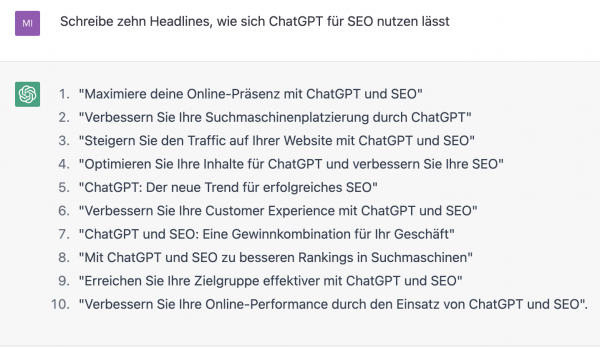
2) Keyword research
As always in writing, keep the target group in mind. A rule of thumb in the context of SEO is therefore: Write your content in terms of the search intentions of your target group.
ChatGPT can help you to identify relevant questions in the context of your target group. If you want to go one step further, you can ask the AI to cluster keywords according to search intention after a well-founded keyword research.
So the command could be: “Classify the following keywords into groups based on the search intent: commercial, transactional or informative.”
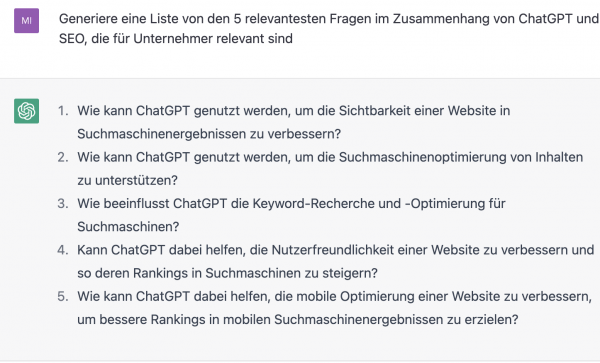
3) Find competitors
As a rule, every domain and every URL in particular is in competition with other websites. ChatGPT can help to get a quick overview of competitors.
But be careful: as mentioned at the beginning, the data is not necessarily up-to-date. It is therefore advisable – as is so often the case with SEO – to also include other tools. The SEO tools Semrush or Searchmetrics offer corresponding functions for this.
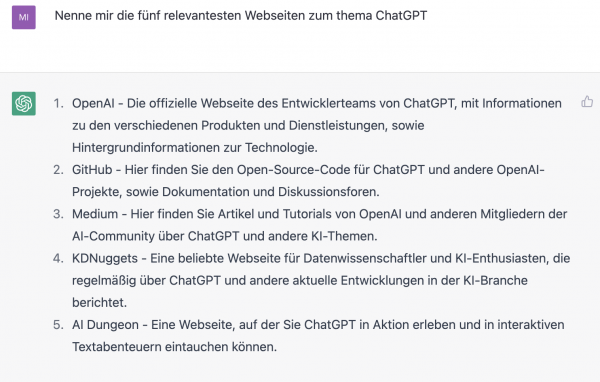
4) Identifying important information
Copywriters are often faced with the challenge: What information is relevant? ChatGPT provides a quick answer in the context of a specific topic.
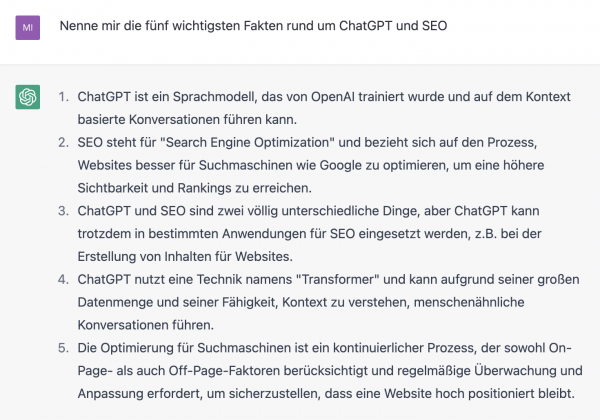
5) Let metadata be texted
Even for professional writers, it is not always easy to get to the heart of an article. ChatGPT can also be a great help here. However, it is important to check again whether the meta description really gets to the heart of the matter – and whether the target group is being addressed correctly.
In general, the more specific the request to ChatGPT, the better the result. In the screenshot, the response to the following instruction appears:
“Create 3 unique meta descriptions of no more than 150 characters for the following text. They should be memorable and contain a call to action, including the keywords: SEO and ChatGPT”. The text of this article was inserted.
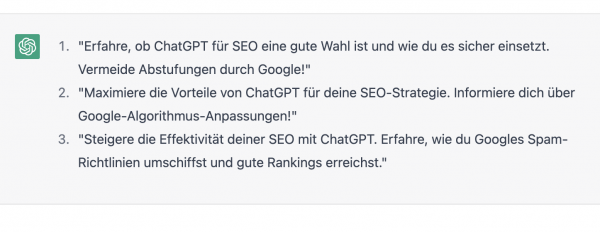
It remains exciting to see how ChatGPT will develop and what measures Google will take in the short and long term. Even now, voice AI is a tool that can support SEO in many ways.
A small tip at the end
If you have an SEO professional in your company or already use a service, you can preventively counteract potential Google measures. In order to credibly signal to Google that one’s own content was written by people, so-called structured data for articles is a good idea. In this way, a clear indication can be sent to the search engine because the authors are named and clearly identifiable.


